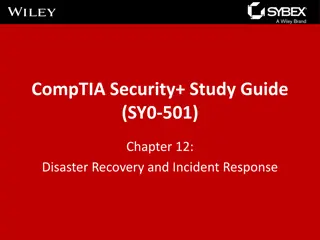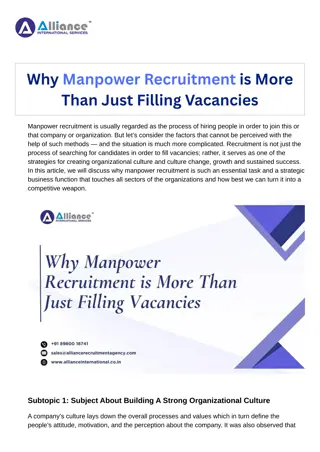Strategies for Maintaining High-Level Continuity During Vacancies
Explore essential practices for managing high-level position vacancies effectively, considering constitutional and statutory frameworks, delegation of authority, and orders of succession. Learn about the Appointments Clause, Vacancies Reform Act, officer identification, and appointment of acting officers in PAS positions.
Download Presentation

Please find below an Image/Link to download the presentation.
The content on the website is provided AS IS for your information and personal use only. It may not be sold, licensed, or shared on other websites without obtaining consent from the author.If you encounter any issues during the download, it is possible that the publisher has removed the file from their server.
You are allowed to download the files provided on this website for personal or commercial use, subject to the condition that they are used lawfully. All files are the property of their respective owners.
The content on the website is provided AS IS for your information and personal use only. It may not be sold, licensed, or shared on other websites without obtaining consent from the author.
E N D
Presentation Transcript
Ensuring Continuity During Vacancies in High-Level Positions
Introduction Purpose: Encourage best practices for appointments and acting designations in high-level positions Constitutional considerations Appointments Clause Statutory framework Vacancies Reform Act Practical considerations planning for vacancies Delegations of authority Orders of Succession
Constitutional Backdrop The Appointments Clause of the U.S. Constitution specifies the procedures through which officers of the United States must be appointed. See Art. II, 2, cl. 2. Default is that all officers must be appointed by the President and confirmed by the Senate Senate confirmation is mandatory for principal officers (e.g., agency heads who report directly to the President) But inferior officers can be appointed through other means as well, including by the President alone or agency heads
Identifying Officers Employees v. Officers Distinguishing characteristic of an officer is the exercise of significant authority pursuant to the laws of the United States No single test for determining what constitutes significant authority Department hierarchy may help guide identification of officer positions
Vacancies in Officer Positions Appointments Clause considerations Statutory framework: Vacancies Reform Act for Senate-confirmed PAS offices General agency authorities for other offices
Vacancies Reform Act Generally applies to: PAS offices within Executive agencies Applies when officer dies, resigns, or is otherwise unavailable to perform the functions and duties of the office Certain offices excluded: 5 U.S.C. 3349c: E.g., members of certain multi-member boards Generally the exclusive means for designating acting officers in PAS offices 5 U.S.C. 3347 Exceptions for offices with separate, specific statutory authorization for temporary service
Three ways to become an Acting Officer in a PAS position Automatically when vacancy arises: First assistants (5 U.S.C. 3345(a)(1)) By presidential designation: Individuals holding presidentially appointed, Senate-confirmed positions (5 U.S.C. 3345(a)(2)) Senior agency official (5 U.S.C. 3345(a)(3))
First Assistants First assistant provision operates automatically Who is first assistant? First assistant does not need to be in office at the time the vacancy occurs (different rules apply if first assistant is nominee) Appointments Clause considerations
Individuals already holding PAS positions May serve as acting officer by presidential designation No length of prior service requirement Individual may be from any agency Individual does not give up their own PAS position while serving as acting
Senior Agency Officials May serve as acting officer by presidential designation Must serve in same agency where vacancy occurs Pay grade and length-of-service requirements: Served in position within agency for 90 of 365 days preceding vacancy Rate of pay for that position must be at least minimum rate of pay for GS-15, step 1 position Must retain an underlying position at the agency while serving as acting officer
How long may an acting officer serve under the Vacancies Reform Act? 5 U.S.C. 3346 In general: (not presidential transition, not vacancy caused by sickness) 210 days from date of vacancy First or second nomination extends time Submission of nomination after expiration of time may allow acting officer to spring back
Timing provisions and presidential transitions Vacancies Reform Act recognizes that new administrations may need more time 5 U.S.C. 3349a Adjusts time for existing vacancies 210-day period begins the later of: 90 days after inauguration day 90 days after date vacancy occurs These special rules apply only when a new President is inaugurated, not when an incumbent begins a second term Recent GAO and OLC opinions
Enforcement Provision 5 U.S.C. 3348 Functions and duties of vacant office may only be performed by head of agency or acting officer serving under Vacancies Reform Act Actions taken by others have no force and effect and may not be ratified What is a function or duty?
Reporting Obligations 5 U.S.C. 3349 Agency must notify Government Accountability Office: Of vacancy Identify individual serving as acting officer Identify nominee upon submission of nomination Provide date of rejection, withdrawal or return of nomination
Acting Officers under the Vacancies Reform Act as Nominees Under the Vacancies Reform Act, a nominee may act in the position for which nominated only if: The nominee is a PAS first assistant, or The nominee was the first assistant for 90 days in the year preceding the vacancy. (5 U.S.C. 3345(b))
Appropriations Riders Rejected nominations: Pub. L. No. 110-161 (Dec. 26, 2007) SEC. 709. Hereafter, no part of any appropriation contained in this or any other Act shall be paid to any person for the filling of any position for which he or she has been nominated after the Senate has voted not to approve the nomination of said person. Twice-returned or withdrawn nominations Pub. L. No. 111-8 (Mar. 11, 2009) SEC. 749. Effective January 20, 2009, and for each fiscal year thereafter, no part of any appropriation contained in this or any other Act may be used for the payment of services to any individual carrying out the responsibilities of any position requiring Senate advice and consent in an acting or temporary capacity after the second submission of a nomination for that individual to that position has been withdrawn or returned to the President.
Position-Specific Statutes Authorizing Acting Officers in PAS Positions Vacancies Reform Act Senate Report provides non-exhaustive list, S. Rep. 105-250 Often, both the Vacancies Reform Act and a particular position-specific statute are available to fill a vacancy on an acting basis Statute-specific assessment
Acting service in Non-PAS Positions No single statute governs authority to name acting officials Agencies often rely on organic authority to delegate and assign responsibilities within agency Appointments Clause considerations
Delegations of authority Relevant to ensure continuity in both PAS and non-PAS offices General principles of delegation Individual exercising delegated duties of a vacant position covered by Vacancies Reform Act does not hold the title acting
Orders of Succession Advance exercises of authority to name acting officials or delegate responsibilities Presidential orders of succession for agency heads Agency orders of succession under specific statutory authority for certain PAS positions Agency orders of succession for non-PAS positions
Resources Guidance on Application of Federal Vacancies Reform Act of 1998, 23 Op. O.L.C. 60 (1999) www.justice.gov/olc/opinions-main Government Accountability Office Website www.gao.gov/legal/federal-vacancies-act/about























